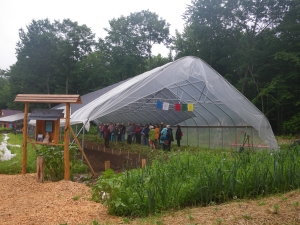Our self-serve farmstand at 165 Chestnut Hill Road Orange is open April to November, and we focus on greens and garlic. We are planning an expanded farmstand for 2021 so stay tuned! You can call 978-544-7564 (landline) for the farm too. Thank you for your patronage, it means a lot.
Seeds of Solidarity Farm was initiated in 1996, on land in the middle of the forest that had not been cultivated for many years. The original inhabitants of the region are the Nipmuc people. As farmers, we utilize regenerative, no-till practices to work to decolonize our relationship with the soil, and commit to keeping produce affordable for our low-wealth region. A conservation restriction on our 30 acres ensures the land will always be used for agriculture, education, and wildlife habitat. With nature as teacher, the land has been transformed into fertile fields and hosts 5 solar hoophouses brimming with our signature greens, fruit and perennial crops, garlic and sacred, traditional crops such as Hopi blue and Narraganset flour corn. The tapestry of our site includes energy efficient and off the grid home, office, and farm outbuildings, including a solar powered farmstand, and celebration art and words of inspiration along the paths.
Did you know there is a soil microbe that creates happiness? Are you interested in volunteering on our no-till human powered farm on Mondays and/or Tuesdays through the spring, summer, and fall? Grow through the seasons each week, as you experience a diversity of approaches to no-till farming for life! Volunteers may come either day, but consistency and commitment is important. We work hard with great conversation and offer you learning, lunch and some veggies to take home. Call Ricky at 978-544-7564 to talk about volunteering.
With the growth in people wanting local food, we ask, ‘How can more people participate not only as consumers, but producers?’ To build local food self-reliance, we need accessible, affordable and yes, fun practices that mimic nature, help decentralize food production and engage more people in cultivating the earth in order to Grow Food Everywhere. We use cardboard on marginal land to foster worms, microbes and mychorrizal fungi that decompose the cardboard and build a fertile soil ecosystem. In addition to an increase in worm castings (poop), using cardboard as mulch helps balance moisture, keep weeds down, and create no-till carbon sinks that retain rather than release CO2 into the atmosphere. Cardboard- a waste product available in most communities– is key to growing gardens on lawns, lots, school yards, municipal buildings for opening up and improving plots of land.
It is an honor to grow food in solidarity with small farmers around the world, and those everywhere helping to feed the people.

